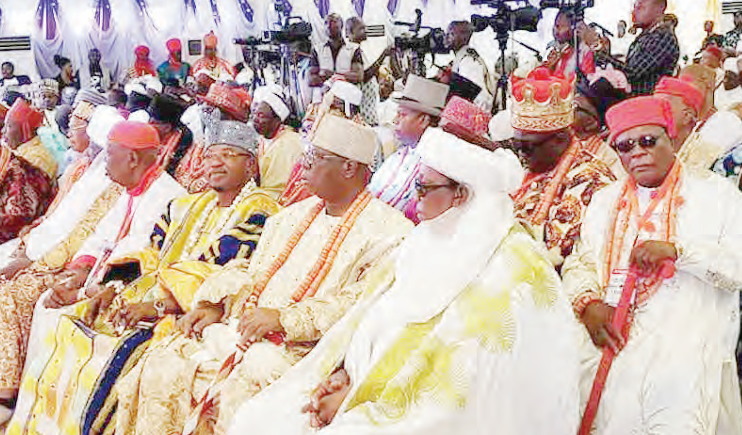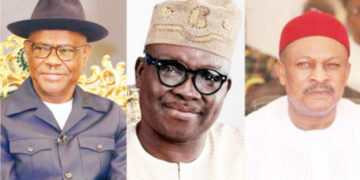Governors and traditional rulers have agreed to strengthen the role of monarchs in national security and governance.
The agreement came during a historic joint meeting between the Nigerian Governors’ Forum (NGF) and the National Council of Traditional Rulers on Wednesday at the Presidential Villa, Abuja.
The gathering, initiated by the NGF chairman and Kwara State Governor AbdulRahman AbdulRazak, centred on a proposed bill before the National Assembly that would formalise traditional rulers’ constitutional role.
Speaking to State House correspondents after the meeting, Ogun State governor Dapo Abiodun said traditional rulers, being close to the grassroots, know their communities better than those higher up in government.
Abiodun said, “We are focused on the constitutional role of traditional rulers in Nigeria. There is a bill before the National Assembly, and today, His Royal Majesty, the Etsu of Nupe, graciously provided an overview of the proposed bill.”
Abiodun stated that the bill would be shared with all in attendance and that a joint committee would be formed to incorporate a feedback mechanism in order to make the document inclusive and reflect citizens’ needs.
Governor Abiodun also underscored traditional rulers’ invaluable role in grassroots security, stating, “Our traditional rulers, being close to the grassroots, know their communities better than we do in government. They know the miscreants, they know the families, and they can better assist in community policing.
“Fortunately, we are blessed with many of them who are highly experienced, extremely lettered, extremely knowledgeable, and we have our retired soldiers,” Governor Abiodun noted, emphasising their potential contribution to national security.
A new joint committee, chaired by the governor of Imo State Hope Uzodinma, and comprising 15 members, will now work on enhancing the proposed legislation.
Governor Abiodun explained their mandate: “Whatever document will be presented to the National Assembly will be very comprehensive, very inclusive – that seeks to empower our royal majesties, royal highnesses more and seeks to involve them in governance, peace, security of our various states across the country, including the FCT.”
The meeting also addressed gender-based violence, and the Sultan of Sokoto’s foundation work in this area was praised.
Governor Abiodun urged other traditional rulers to follow his example, noting that “because of the level of trust that our citizens have in our traditional institutions who are not tenured… that trust allows them to establish referral centres from local governments through their channels.”
Local government autonomy’s impact on traditional institutions was also discussed, with governors briefing the monarchs on recent Supreme Court rulings.
The discussion was aimed at ensuring a clear understanding of these changes as implementation begins.
Etsu Nupe, who presented the bill’s overview, said the proposed legislation addresses crucial aspects of traditional leadership.
He noted that it covers the structure and function of traditional institutions and also insulates traditional rulers from partisan politics.
The traditional rulers, led by the Sultan of Sokoto and co-chaired by the Ooni of Ife, expressed enthusiasm about their proposed enhanced roles.
The Etsu Nupe highlighted the wealth of experience within their ranks, saying the institution now has professionals and technocrats from various fields of endeavour.
He said, “So we believe strongly if the institution is well founded, God’s willing, we will perform our utmost, as rightly observed by His Excellency. Our institution is now blessed with professionals, the military, technocrats, and all the fields you think about. So we served this country for 30 years, 40 years before we retired, and now we retire to another assignment of leading our people.
“So I think we’re the best of our crop that can conveniently lead our people and address the challenging problems we are facing in terms of social, political, economic and security, peace and what have you in this country.
So we served this country for 30 years, 40 years before retiring, and now we are retiring again to another assignment of leading our people.”





